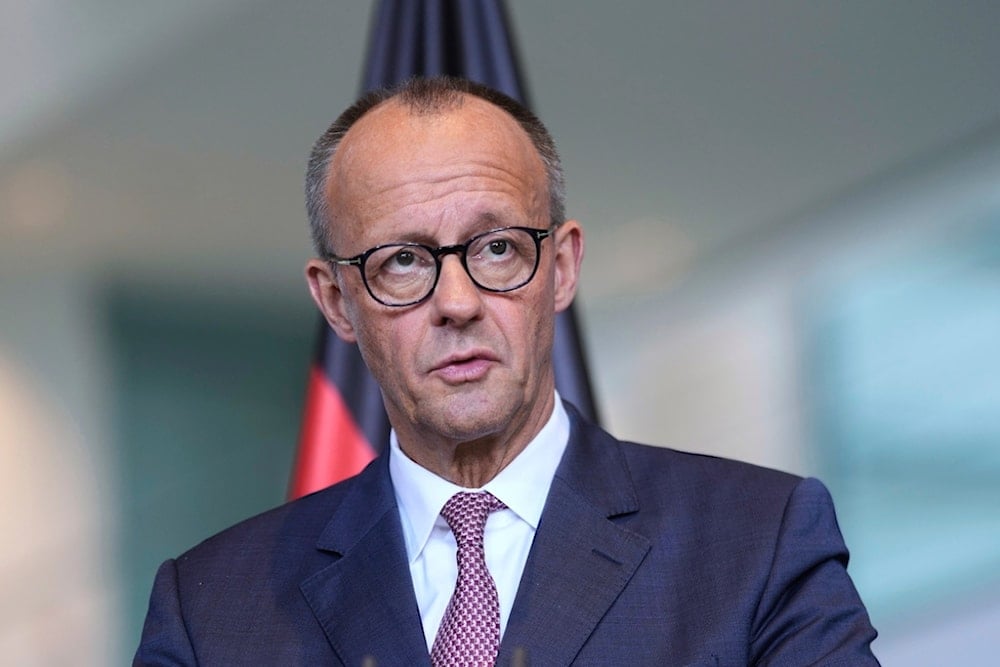Germany defies court ruling, to continue rejecting asylum seekers
Germany’s new government will continue border pushbacks despite a court ruling that such asylum rejections violate EU law and refugee protections.
-

Germany's Chancellor Friedrich Merz attends a news conference at the chancellery in Berlin, Germany, Wednesday, May 28, 2025. (AP)
Germany’s new conservative government announced Monday it would continue turning asylum seekers away at its borders, despite a court ruling declaring the practice illegal. The announcement came just hours after Berlin’s Administrative Court ruled against the controversial policy introduced by Chancellor Friedrich Merz’s government on May 7, one day after taking office.
The ruling stems from the case of three Somali nationals who attempted to seek asylum at a train station in Frankfurt an der Oder, near the Polish border, on May 9. Despite expressing their intent to seek asylum, the individuals were sent back to Poland the same day. The court found this pushback to be unlawful, emphasizing that under the EU's Dublin regulation, asylum claims must be processed before determining the responsible state.
The court ruled that people who express a desire to claim asylum "may not be sent back" before a proper evaluation is conducted. It rejected the government’s argument that border pushbacks were necessary to maintain public order and security, stating Berlin had failed to demonstrate any credible threat.
'We will continue the pushback'
Nevertheless, Interior Minister Alexander Dobrindt insisted the government would press on. “We will continue with the pushbacks,” Dobrindt declared, adding that he believed the administration still had legal grounds for the policy.
He dismissed the ruling as relevant only to the "individual case" of the Somali plaintiffs and said the government intended to pursue further legal proceedings to reinforce its stance, though it remains unclear whether such action is possible, as the court labeled Monday’s ruling final.
Under the EU’s Dublin system, migrants must seek asylum in the first EU country they enter. While that rule permits transfers of asylum seekers between member states, it does not allow border authorities to deny individuals the right to file a claim altogether.
Merz's administration came to power on promises to tighten borders and reduce irregular entries. Critics say the government’s continued defiance of judicial authority risks undermining EU asylum law and refugee protections.
Attacks increase against refugees
Berlin reported in April a significant increase in attacks on refugees in Germany, with both asylum seekers and refugee shelters targeted amid a broader rise in far-right crime and the tightening of German migration policy.
Official figures, provided at the request of two Green Party lawmakers, reveal that in 2024, 77 assaults on asylum seekers and refugees took place in Berlin, along with eight cases of deliberate damage to refugee residences.
This marks a steep rise from 2023, when there were 32 assaults on individuals and no reported attacks on shelters, according to lawmaker Ario Ebrahimpour Mirzaie.
As a result of the assaults, 34 people required hospital treatment, including 16 women, 14 men, two girls, and two individuals whose ages were not specified. Authorities identified 37 suspects in these direct assaults, 11 of whom were already known to police. No solid leads have been found regarding the attacks on refugee shelters.
Germany’s migration policy hardens as rightwing extremism rises
The Interior Ministry reported 218 politically motivated assaults on refugee shelters in 2024, up from 167 in 2023. However, crimes against individual asylum seekers dropped to 1,905, down from 2,488 in 2023.
Federal statistics show a 17% rise in rightwing extremist crimes in 2024, with 33,963 offenses reported by the end of November, including 1,136 violent attacks. Official annual figures are expected next month.
The anti-immigration Alternative für Deutschland (AfD) party gained over 20% of the vote in February’s snap election, becoming the largest opposition force in parliament. This rise has been linked to public concerns over immigration and recent violent incidents involving asylum seekers.
Conservative leader Friedrich Merz, set to be sworn in as chancellor on May 6, campaigned on stricter border policies and reducing irregular immigration.
Though a coalition agreement with the Social Democrats softened some of his proposals, it includes tougher measures such as suspending family reunifications for many refugees, increased border controls, and plans for deportations to countries previously excluded, like Syria and Afghanistan.

 4 Min Read
4 Min Read










